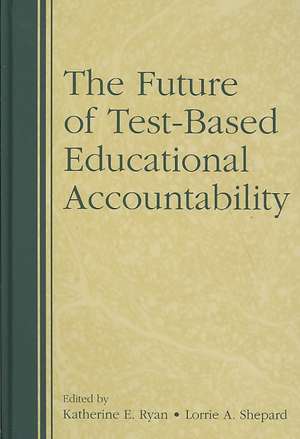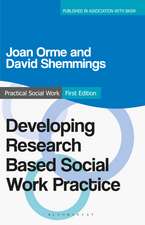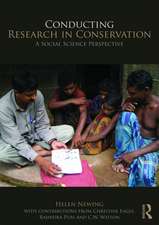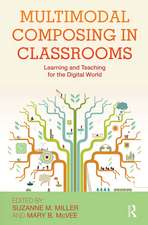The Future of Test-Based Educational Accountability
Autor Katherine Ryan, Lorrie Sheparden Limba Engleză Hardback – 11 iun 2008
| Toate formatele și edițiile | Preț | Express |
|---|---|---|
| Paperback (1) | 442.50 lei 6-8 săpt. | |
| Taylor & Francis – 9 iun 2009 | 442.50 lei 6-8 săpt. | |
| Hardback (1) | 1004.20 lei 6-8 săpt. | |
| Taylor & Francis – 11 iun 2008 | 1004.20 lei 6-8 săpt. |
Preț: 1004.20 lei
Preț vechi: 1224.64 lei
-18% Nou
Puncte Express: 1506
Preț estimativ în valută:
192.16€ • 201.13$ • 159.93£
192.16€ • 201.13$ • 159.93£
Carte tipărită la comandă
Livrare economică 31 martie-14 aprilie
Preluare comenzi: 021 569.72.76
Specificații
ISBN-13: 9780805864700
ISBN-10: 0805864709
Pagini: 336
Ilustrații: 10 tables
Dimensiuni: 152 x 229 x 22 mm
Greutate: 0.57 kg
Ediția:New.
Editura: Taylor & Francis
Colecția Routledge
Locul publicării:Oxford, United Kingdom
ISBN-10: 0805864709
Pagini: 336
Ilustrații: 10 tables
Dimensiuni: 152 x 229 x 22 mm
Greutate: 0.57 kg
Ediția:New.
Editura: Taylor & Francis
Colecția Routledge
Locul publicării:Oxford, United Kingdom
Cuprins
Preface and Organization of the Book
Part I. THE CONTEXT OF EDUCATIONAL ACCOUNTABILITY
Chapter 1. Educational Accountability Systems. Robert Linn
Chapter 2. A Brief History of Accountability Testing: 1965-2007. Lorrie Shepard
Chapter 3. The Politics of Educational Accountability: Can the Clock be Turned Back? Lorraine McDonnell
Part II. EDUCATIONAL ACCOUNTABILITY: TECHNICAL AND SUBTANTIVE ISSUES
Chapter 4: Further Steps Toward the Development of an Accountability-Oriented Science of Measurement. Dan Koretz
Chapter 5: Reliability of Large-Scale Assessment and Accountability Systems. Vonda Kiplinger
Chapter 6: Equating and Linking of Educational Assessments in High-Stakes Accountability Systems. Vonda Kiplinger and Laura Hamiliton
Chapter 7: Standard Setting. Edward Haertel
Chapter 8: Toward a Normative Understanding of Student Growth. Damian Betenbenner
Chapter 9: Causes and Effects. Derek Briggs and Ed Wiley
Chapter 10: Fairness Issues and Educational Accountability. Katherine E. Ryan
PART III: EDUCATIONAL ACCOUNTABILITY EFFECTS
Chapter 11: Accountability and Assessment: Is Public Interest in K-12 Education Being Served? Joan Herman
Chapter 12. A View from the Teacher Trenches: Accountability and the Betrayal of the Standards Vision. Bella Rosenberg
Chapter 13: School Improvement and Educational Accountability. David Miller
Chapter 14: Enhanced Assessment for School Accountability and Student Improvement. Steven Dunbar
Part IV FUTURE DIRECTIONS FOR EDUCATIONAL ACCOUNTABILITY
Chapter 15: Learning and Assessment in an Accountability Context. Eva Baker
Chapter 16: Future Directions for Educational Accountability: Notes for a Political Economy of Measurement. Michael Feuer
Part I. THE CONTEXT OF EDUCATIONAL ACCOUNTABILITY
Chapter 1. Educational Accountability Systems. Robert Linn
Chapter 2. A Brief History of Accountability Testing: 1965-2007. Lorrie Shepard
Chapter 3. The Politics of Educational Accountability: Can the Clock be Turned Back? Lorraine McDonnell
Part II. EDUCATIONAL ACCOUNTABILITY: TECHNICAL AND SUBTANTIVE ISSUES
Chapter 4: Further Steps Toward the Development of an Accountability-Oriented Science of Measurement. Dan Koretz
Chapter 5: Reliability of Large-Scale Assessment and Accountability Systems. Vonda Kiplinger
Chapter 6: Equating and Linking of Educational Assessments in High-Stakes Accountability Systems. Vonda Kiplinger and Laura Hamiliton
Chapter 7: Standard Setting. Edward Haertel
Chapter 8: Toward a Normative Understanding of Student Growth. Damian Betenbenner
Chapter 9: Causes and Effects. Derek Briggs and Ed Wiley
Chapter 10: Fairness Issues and Educational Accountability. Katherine E. Ryan
PART III: EDUCATIONAL ACCOUNTABILITY EFFECTS
Chapter 11: Accountability and Assessment: Is Public Interest in K-12 Education Being Served? Joan Herman
Chapter 12. A View from the Teacher Trenches: Accountability and the Betrayal of the Standards Vision. Bella Rosenberg
Chapter 13: School Improvement and Educational Accountability. David Miller
Chapter 14: Enhanced Assessment for School Accountability and Student Improvement. Steven Dunbar
Part IV FUTURE DIRECTIONS FOR EDUCATIONAL ACCOUNTABILITY
Chapter 15: Learning and Assessment in an Accountability Context. Eva Baker
Chapter 16: Future Directions for Educational Accountability: Notes for a Political Economy of Measurement. Michael Feuer
Notă biografică
Katherine E. Ryan is Associate Professor in the Educational Psychology Department at the University of Illinois at Urbana. Her research interests focus on educational evaluation and the intersection of educational accountability issues and high stakes assessment.
Lorrie A. Shepard is Professor of Education and the Dean of the School of Education at the University of Colorado at Boulder. Her research focuses on psychometrics and the use and misuse of tests in educational settings.
Lorrie A. Shepard is Professor of Education and the Dean of the School of Education at the University of Colorado at Boulder. Her research focuses on psychometrics and the use and misuse of tests in educational settings.
Recenzii
"The book includes chapters on the context, technical and substantive issues, effects, and future directions of educational accountability, written by a veritable "Who’s Who" in the field of educational measurement…Overall, The Future of Test-Based Educational Accountability does an admirable job of distilling the knowledge of many of the nation’s best thinkers in educational measurement, both policy and practice."—William L. Brown, Education Review (May 2009)
Descriere
In recent decades testing has become a much more visible and high-stakes accountability mechanism that is now seen as a powerful tool that can be used to drive school improvement. The purpose of this book is to identify and analyze the key issues associated with test-based educational accountability and to chart the future of educational accountability research. Chapter contributions are intended to be forward looking rather than a compendium of what has happened in the past. The book provides an accessible discussion of issues such as validity, test equating, growth modeling, fairness for special populations, causal inferences, and misuses of accountability data.
















